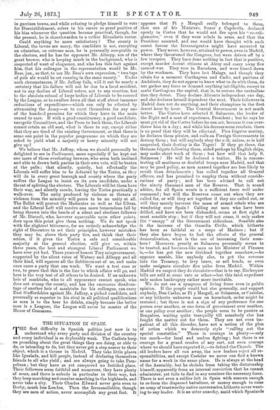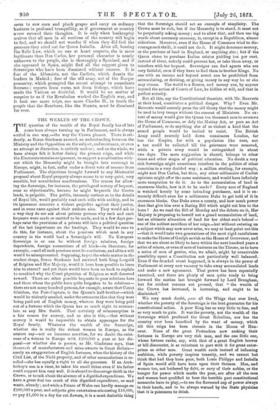THE SITUATION IN SPAIN.
THE first difficulty in Spanish polities just now is to understand why every party and division of the country and every individual is so deplorably weak. The Carlists keep on preaching about the great things they are doing, or able to do, or intending to do, but they never get a step nearer to their object, which is a throne in Madrid. They take little places like Igualada, and kill people, instead of declaring themselves friends to all who yield ; and are always going to take Pam- peluna ; but they have as yet conquered no fortified place. Their followers seem faithful and numerous, they have plenty of arms, and there is nobody in particular in their way, but they keep marching and counter-marching in the highlands, and never take a city. Their Charles Edward never gets even to Derby, much less London. Then the Irreconcilables, though they are men of action, never accomplish any great feat. It I appears that Pi y Margall really belonged to them, that one of his Ministers, Super y Capdevila, declared openly in Cortes that he would not fire upon his " co-reli- gionaries," even if they were rebels in arms, and that the President assented, and one would have thought with such secret favour the Intransigentes might have mounted to power. They never, however, attained to power, even in Madrid, where they threatened the Congress, but were driven off by a few troopers. They have done nothing in fact that is positive, except murder decent citizens at Alcoy and carry away five men-of-war. They rose in Barcelona, and were hissed down by the workmen. They have lost Malaga, and though they retain for a moment Carthagena and Cadiz, and portions of Andalusia, they do not appear to know what to do with them, do not gather any force or demand anything intelligible, except to make Carthagena the capital, that is, to restore the centralisa- tion they detest. They declare Alicante independent one day, and she declares herself dependent the next. Their followers in Madrid dare not do anything, and their champions in the fleet desert hour by hour. The Central Government is not much better. The Cortes have selected S. Salmeron, the leader of the Right and a man of experience, President ; but he says he must get rid of the Cortes before he can act., because it can over- throw him in a day ; and while his decrees seem resolute, there is no proof that they will be effectual. Five frigates mutiny, he declares them pirates, and calls on Foreign Governments to destroy them ; but will anybody obey the call, unless, as is half suspected, their destiny is the Tagus? If they go there, the German frigate following them, aided perhaps by English ships, may make short work of them ; but how will that help S. Salmeron ? He will be declared a traitor. He is concen- trating all mutinous or doubtful troops near Madrid, and that may be good policy, as men massed together are less likely to revolt than detachments ; has called together all General officers, and has promised to employ them without conside- rations of party ; and has been advised to call out the ninety thousand men of the Reserve. That is sound advice, for all Spain wants is a sufficient force well under command ; but will the Reserves come out when they are called for, or will they act together if they are called out, or will they merely increase the mass of armed rebels who are wandering over Spain ? Calling out men who have been drilled, and have not been disbanded, seems at first sight a most sensible step ; but if they will not come, it only makes the " energy " of the Government ridiculous. Sensible also is the increase of the Guardia Civile, which hitherto has been as faithful as a corps of Marines ; but if they also have begun to feel the effects of the general demoralisation, what is the use of increasing their num- bers ? Moreover, greatly as Salmeron personally seems to be trusted, and business-like man as his Minister of Finance is,—he has got the new dividend together somehow,—he appears unable, like anybody else, to get the revenue into the Treasury, to levy taxes, or sell bonds, or even make assignats circulate five miles from Madrid. Within Madrid we suspect they do circulate—that is to say, Exchequer bills are sold at some rate or other—but this fatal expedient only makes bankruptcy rather more inevitable.
We do not see a symptom of living force even in public opinion. If the people would but rise generally, and support anybody, Don Carlos, or Pi y Margall, or Salmeron, or Castelar, or any hitherto unknown man on horseback, order might be restored ; but there is not a sign of any preference for one person over another, or one form of government over another, or one policy over another ; the people seem to be passive as Bengalees, waiting quite tranquilly till somebody else has fought the matter out for them. They are not even im- patient of all this disorder, have not a notion of the plan of action which we demurely style "calling out the special constables." There is courage in plenty—only too much—for local and useless fighting ; but there is no courage for a grand resolve of any sort., not even courage where we should have expected it,—to defend the Church. The old leaders have all run away, the new leaders reject all re- sponsibilities, and except Castelar we never can find a known name for a week in the same place. He is always at the head of the Assembly, but he shrinks from taking the dictatorship himself, apparently from an internal conviction that he cannot administer, yet fails to find in any nominee the necessary force. There is not even a soldier left in Spain with renown enough to re-form the dispersed battalions, or money enough to raise an army of trustworthy native mercenaries,hitherto never want- ing to any leader. It is an utter anarchy, amid which Spaniards seem to sow corn and pluck grapes and carry on ordinary business in profound tranquillity, as if government or country never entered their thoughts. It is only when bankruptcy arrives that all men in all sections of the country will begin to feel, and we should not wonder if when they did feel the pressure they cried out for Queen Isabella. After all, barring the Salic Law, which no one at heart respects, she is more legitimate than Don Carlos, her personal character is nearly unknown to the people, she is thoroughly a Spaniard, and if she appeared in Spain, might find all the support given to Sovereigns who have been dismissed without success. It is fear of the Alfonsists, not the Carlists, which daunts the leaders in Madrid ; fear of the old army, not of the Basque peasantry, which prompted the recent attempt to assassinate Serrano ; reports from cures, not from bishops, which have made the Vatican so doubtful. It would be no matter of surprise to us if the Revolution worked the English way, and it took one more reign, one more Charles II., to teach the people that the Bourbons, like the Stuarts, must be dismissed for ever.



































 Previous page
Previous page